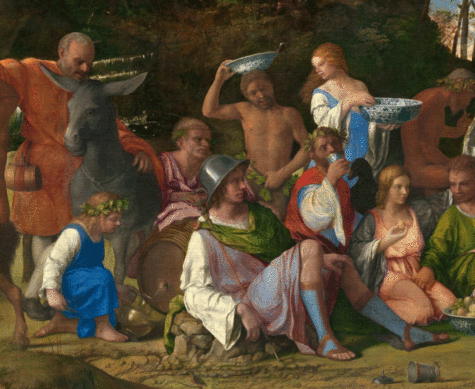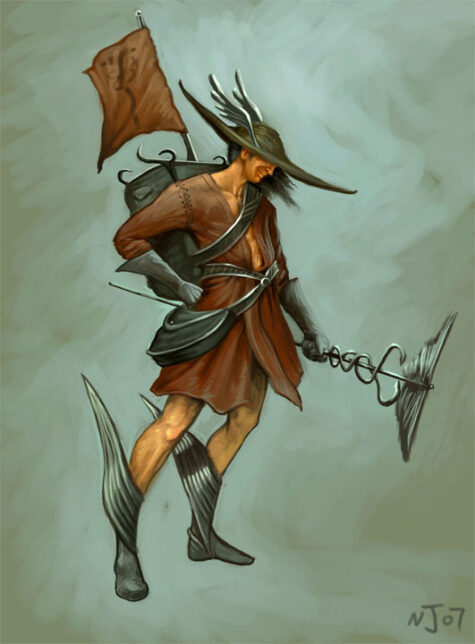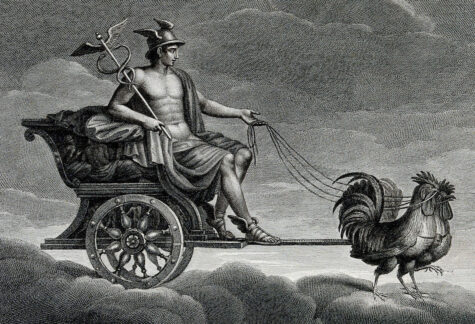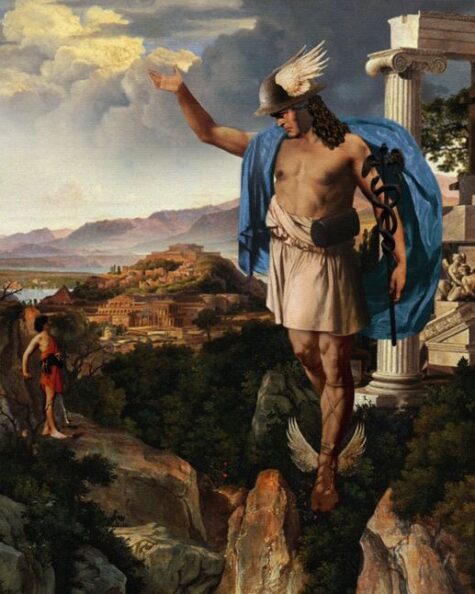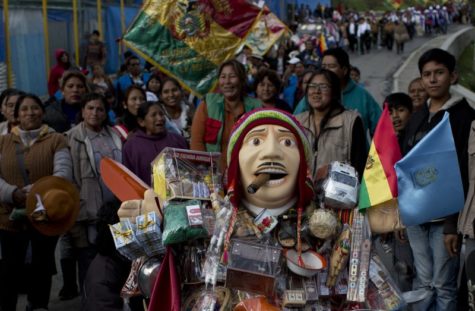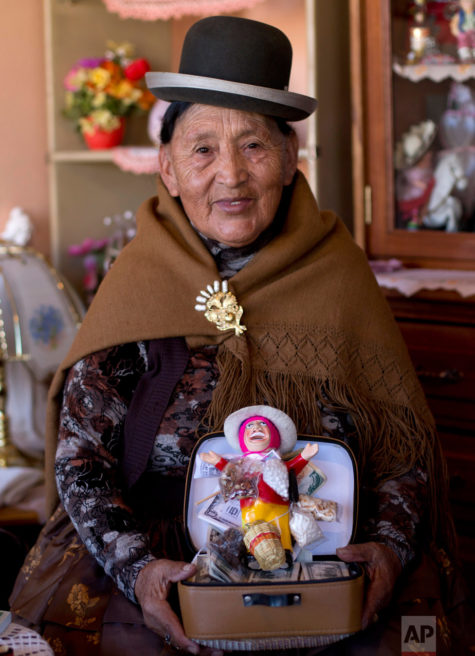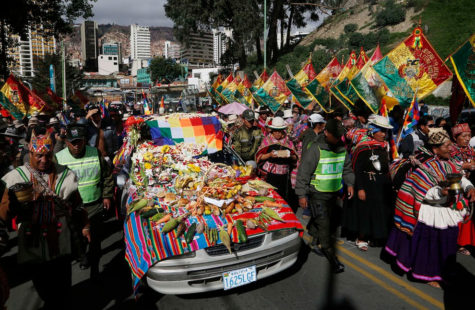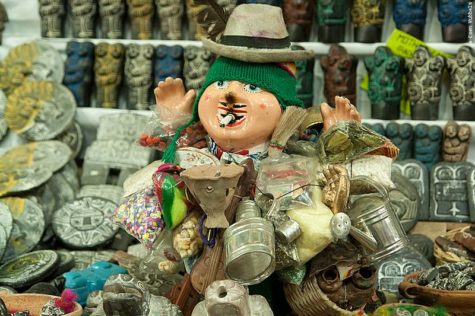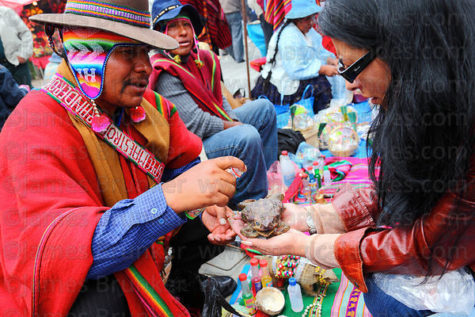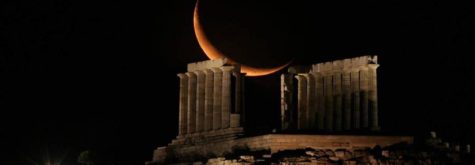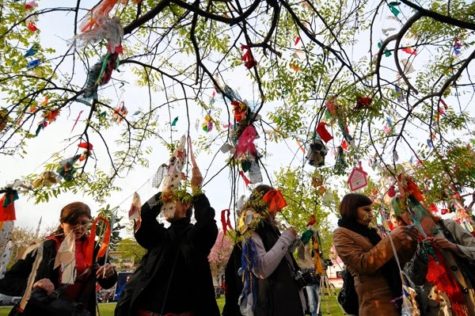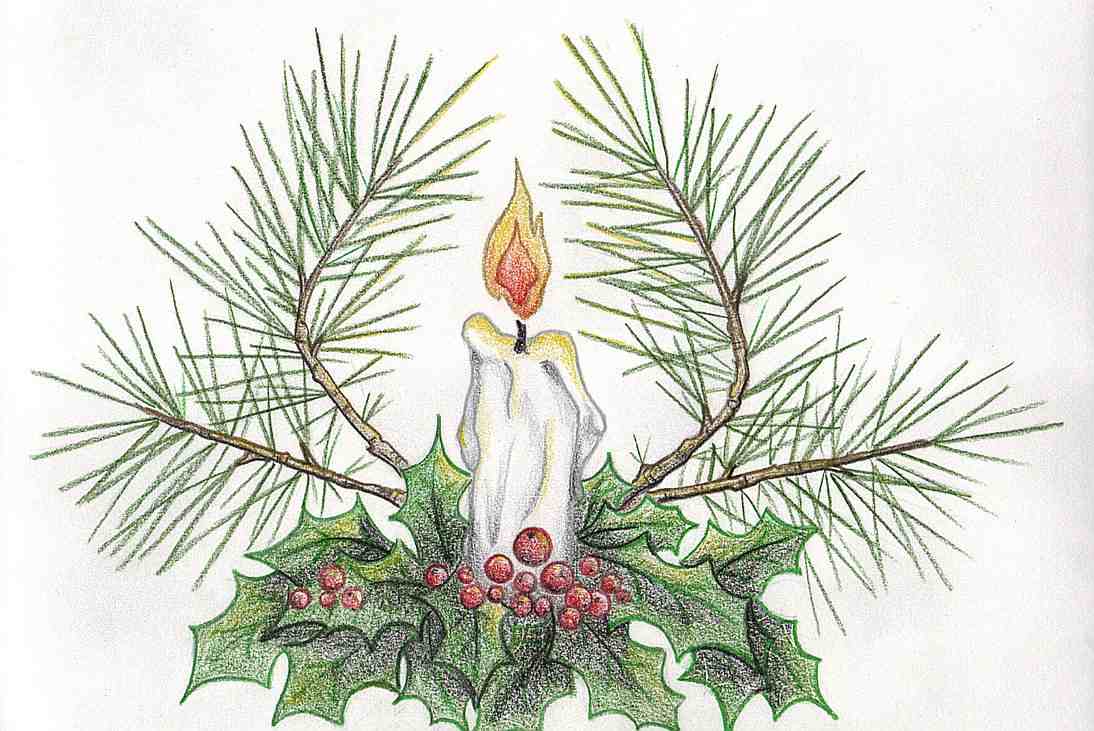Prosperity
Mercuralia is a Roman celebration known also as the “Festival of Mercury”. Mercury (Greek counterpart: Hermes) was the god of merchants and commerce. On May 15 merchants would sprinkle their heads, their ships and merchandise, and their businesses with water taken from the well at Porta Capena.
Some traditions celebrate the Mercuralia on May 4 because Mercury is the Roman incarnation of the Greek god Hermes. The sacred number of Hermes is four and it is said that his mother Maia gave birth to him on the fourth day of the month. The month of May is, of course, named after Maia.
About Mercury:
Mercury is a trickster spirit who is happy to masquerade as other spirits. Long ago the Italian deity Mercury was syncretized to Greek Hermes. The two are now virtually indistinguishable, but they are not the same spirit. Mercury is urban, while the roots of Hermes lie in the rustic countryside. Hermes has a a broader base of interests, while Mercury is a spirit of money, finances, and prosperity. His name is related to words like merchants, merchandise, or commerce as well as mercenary, a soldier of fortune.
Mercury is a generous spirit but his temperament is mercurial. He loves practical jokes and word games. Always be exceptionally careful how you phrase petitions to him, paying close attention to nuance and implication, lest he give you what you accidentally asked for, rather than what he knows very well that you desire.
Mercury has quicksilver intelligence and wit. He is easily bored. Keep him entertained and he’ll be more likely to keep you happy, healthy, and prosperous. Although Mercury patronizes the dishonest, he may also be invoked to protect against them.
Homeric Hymn to Hermes:
I sing about Hermes, the Cyllenian slayer of Argus, lord of Mt. Cyllene and Arcadia rich in flocks, the messenger of the gods and bringer of luck, whom Maia, the daughter of Atlas, bore, after uniting in love with Zeus.
She in her modesty shunned the company of the blessed gods and lived in a shadowy cave; here the son of Cronus used to make love to this nymph of the beautiful hair in the dark of night, without the knowledge of immortal gods and mortal humans, when sweet sleep held white-armed Hera fast.
But when the will of Zeus had been accomplished and her tenth month was fixed in the heavens, she brought forth to the light a child, and a remarkable thing was accomplished; for the child whom she bore was devious, winning in his cleverness, a robber, a driver of cattle, a guide of dreams, a spy in the night, a watcher at the door, who soon was about to manifest renowned deeds among the immortal gods.
Maia bore him on the fourth day of the month. He was born at dawn, by midday he was playing the lyre, and in the evening he stole the cattle of far-shooting Apollo.
So hail to you, son of Zeus and Maia. Hail, Hermes, guide and giver of grace and other good things.
Invocation to Hermes-Mercury-Tjehuti:
Hail to you, Hermes-Mercury-Tjehuti,
Fleet-footed Messenger of the Gods,
In all your many faces.
Come down from Mount Olympus,
Fly in from the mighty city of Roma,
Rise up from the land of Kemet,
Race across land and sea with your legendary speed,
And come join me this day!
As Hermes you are known as Argophontes,
The Psychopomp who guides souls to the Underworld,
Who, with your wand, bestows and banishes sleep and guides us through dreams,
You whose cleverness and oratory is unmatched,
With honeyed tongue and charm you ease your way through conflict,
Divine trickster extraordinaire,
Patron of learning and the sciences,
Patron of travelers on their journeys,
Of thieves and merchants,
Of wrestlers and magicians.
Ritual For The Mercuralia
The Greeks believed that the Egyptian god Tjehuti (Thoth) was also an incarnation/aspect of Hermes (or vice versa). This ritual honors the tri-form nature of this God by the name of Hermes-Mercury-Tjehuti.
I see Mercury as the most materially-oriented of the three aspects, focusing on business, commerce, and finances. I see Tjehuti as the most spiritually-oriented of the three aspects, focusing on wisdom, knowledge, abstract concepts, and the higher self. I see Hermes as a dynamic balance of the two, the aspect that binds them together.
For a ritual honoring and invoking Mercury, Hermes, and Tjehuti. You will need the following:
- Orange candle (representing Hermes)
- Yellow candle (representing Mercury)
- Purple candle (representing Tjehuti/Thoth)
- Fresh and dried peppermint (alternatively the candles can be anointed with peppermint essential oil)
- A dime with the head of Mercury on it (optional)
Set the mood by reading the Homeric Hymn to Hermes (above). Then invoke the Messenger of the Gods by reading aloud the Invocation to Hermes-Mercury-Tjehuti (above).
- Light the orange candle and say:
“As Mercury you rule communication and commerce.”
- Light the yellow candle and say:
“As Tjehuti you are the Voice of Ra,
Keeper of the Akashic Records and Karma,
Great one of truth, wisdom, and knowledge,
Great of Magick, Great of Healing.”
- Light the purple candle and say:
“Hermes-Mercury-Tjehuti,
I welcome you with an open mind and an open heart!”
Sprinkle dusted peppermint onto the candles and/or place freshly picked peppermint by the candles. If you have the dime, place it mercury side up next to the candles.
Spend time with the God’s presence and/or tell him of any financial, communicative, motivational, career, educational, or any other problem you’re having that is related to his many powers if you wish his help. Remember, his aid is less direct than many of the other deities’, for he is the God of cunning, guile, and oratory. Finally, close by saying:
Thank you for coming, blessed Hermes! Come and go in peace!
Extinguish the orange candle
Thank you for coming, blessed Mercury! Come and go in peace!
Extinguish the yellow candle
Thank you for coming, blessed Tjehuti! Come and go in peace!
Extinguish the purple candle
If you had freshly picked peppermint, leave it outside as an offering. Leave what is left of the extinguished candles at a busy crossroads. Leave the dime as an offering in a place where there might be merchants, magicians, travelers, jokesters or thieves.
Sources:
Thousands of working class Bolivians crowd the streets of La Paz every year to buy miniature cars, houses and wads of fake dollar bills representing their dreams of wealth.
Alasitas is a 3-week long fair that, in La Paz, takes place beginning on the 24th of January and in Santa Cruz takes place in September. “Alasitas” is an Aymaran word that means “buy me”, and is the name of the annual fair where people buy miniature items that represent things they hope to attain within the year.
Alasitas is often referred to as the festival of miniatures, as the capital city of La Paz turns into a large market of small things that may become big if you know who to ask. Locals come and buy anything from tiny mobile phones, laptops, cars, and houses, to non-material things like love in the form of a male or female doll, or even matrimony in a form of a marriage certificate.
The festival is held in honor of the indigenous “god of bounty” or “abundance” called Ekeko (sometimes spelled Ekkekko, or Ekkeko). He is often rendered as a short, pudgy, mustached man who wears traditional Andean clothes and carries baskets of grains. Tiny items, from kitchen appliances to college diplomas, are taken home and placed around Ekeko, who the Aymara people believe will bless them with better lives in the coming year.
Hundreds accompany the Bolivian deity statuette “illa of Ekeko” as it is driven to the Alasitas Fair. Andean religious leaders carry urns with burning incense in a procession of the Bolivian deity statuette “illa of Ekeko” as it is driven to the Fair. The pre-Columbian figurine that symbolizes abundance was recently returned to Bolivia by the National Museum of Berna in Switzerland, 156 years after being taken away from its native country.
Images of Ekeko and other items, such as imitation bank notes are blessed during the festivities. The Ekeko statuette is traditionally given a cigarette, sprinkled with alcohol and surrounded with all the miniature items bought at the Alasitas Fair “so our wishes come true that year.”
Many bring their diminished dreams to the statues of Ekkekko they store at home, light a cigarette for he is known as a great smoker, dedicate a few prayers, and then wait for the miraculous gifts which will come within the next year.
Ekeko is the household god and it is not unusual for Bolivians to have a representation of this short and chubby, happy-looking fellow with a mustache and dressed in Andean clothes in their home. To ensure good luck the statue should be received as a gift and not be personally bought. Ekeko brings wealth to the family and keeps misfortune at bay.
To obtain the favor of fortune, Bolivians like to present Ekeko with miniatures – mostly made of a sugary substance – of things they would like to own. This can be a house, a car, furniture, clothes, an airplane but also food. A miniature passport may be bought if one has the wish to travel, a university diploma in case one wants to study or when graduation is near.
Perfectly copied miniature dollar and euro notes are favored over local bolivianos when a devotee wants wealth. Ekeko loves smoking, his statue has a special hole in the mouth for a cigarette.
During Alasitas, the streets are crammed with people who need to buy their miniatures replicas in time – the blessings will take place around noon and they should be prepared by then.
Locals claim if you really believe in miracles, you will get what you want, and many testify it truly works.
Alasitas’ main divinity is Ekeko, but Catholic priests give their blessing to the newly acquired miniature goods as well, while simultaneously honoring the Virgin of La Paz. Whereas the Franciscans focus on the Virgin, the yatiris – the local wizards – focus on Ekeko; the average Bolivian cares about both.
There is not one conclusive theory about how and where the festival started. In the Aymará language, alasitas means ‘buy from me’ and in pre-colonial times Alasitas was always celebrated in September (Bolivian springtime), to ensure a good crop. It is said that the Spanish changed the date to January 24 in commemoration of an indigenous uprising in 1781 and the siege of La Paz by Tupac Katari.
During the colonization the Spanish tried to force Catholicism on the indigenous people. They partly succeeded and many Bolivians converted to Catholicism, however, in reality the Bolivian religion became a mix of Catholicism and traditional Andean beliefs and rituals, which is easily recognized during, for instance, Alasitas.
Sources:
The Noumenia is the first day of the visible New Moon and is held in honor of the household Gods. The Noumenia is also considered the second day in a three day household celebration held each lunar month – Hekate’s Deipnon is on the last day before the first slice of visible moon and is the last day in a lunar month, then the Noumenia which marks the first day in a lunar month, followed by the Agathos Daimon (Good Spirit) on the second day of the Lunar month.
The Noumenia is a celebration of the start of a new Hellenic month and seeks blessings for the household. Offerings such as incense or honey cakes are made to your household Gods at your family altar.
- Here’s a recipe for Ancient Hellenic Honey Cakes.
Traditionally, the household Gods consist of Hestia, Zeus Ktesios, Hermes, Hekate, Apollon Agyieus, your household’s Agathos Diamons and can include any ancestors you honor. However, many Hellenic Polytheists do honor more Gods at their family altar.
You can celebrate the Noumenia with the following rituals:
- Decorate their home with fresh flowers, evergreen branches, or other seasonal decorations.
- Serve a big family meal and eat it at the dining room table.
- Create a list of family goals or projects to get done or start within the next lunar month.
- Bake a special dessert that you only make on this day – such as Honey Cake.
- Like the ancient Athenians, you can burn frankincense and read the Orphic and Homeric hymns to Selēnē.
- Replace the ingredients in the Kadiskos (see below) with fresh water, oil, and fruit, and bits of food.
The Kadiskos is a small jar containing food stuffs that we receive from the Gods and give back in reciprocity. Refreshing the Kadiskos is part of preparing for Noumenia. Here are directions for Making a Kadiskos.
Hellenic Worship:
Hellenic worship makes notice of the New Moon, because it marks the beginning of the month, rather than the more obvious full moon, although many Hellenic festivals are held during or near the time of the full moon.
“The first day of the month was new moon day (noumēnia), recognized as a holy day throughout the Greek world. It was so holy that at Athens, no other festival ever took place that day. It was celebrated by a public ritual on the Acropolis and by private offerings of frankincense to statues of the gods.”
Herodotus says that, in Sparta, meat, barley meal and wine were distributed to the citizens by the Kings on the Noumenia.
Hymn To Selene
Orphic Hymn 9 to Selene says that she “Delights in stillness and in the kindly, auspicious night.” Many of the Orphic hymns, and this one especially, reminds us that the arrival and passage of each new month is a reflection of the cycle of lives, with birth following the period of dark death. So as She is “a sure token and a sign to mortal men,” so we can trust in the cycle of rebirth and renewal.
Orphic Hymn 9 ~
Fumigation from Aromatics
Hear, goddess queen (thea basileia), diffusing silver light, bull-horned, and wandering through the gloom of night.
With stars surrounded, and with circuit wide night’s torch extending, through the heavens you ride: female and male, with silvery rays you shine, and now full-orbed, now tending to decline.
Mother of ages, fruit-producing Mene (Moon), whose amber orb makes night’s reflected noon: lover of horses, splendid queen of night, all-seeing power, bedecked with starry light, lover of vigilance, the foe of strife, in peace rejoicing, and a prudent life: fair lamp of night, its ornament and friend, who givest to nature’s works their destined end.
Queen of the stars, all-wise Goddess, hail! Decked with a graceful robe and amble veil.
Come, blessed Goddess, prudent, starry, bright, come, moony-lamp, with chaste and splendid light, shine on these sacred rites with prosperous rays, and pleased accept thy suppliants’ mystic praise.
More Hymns, Prayers, and Invocations can be found at Widdershins.
A Prayer For The Noumenia
In honor of the Noumenia of Anthesterion:
I have seen the moon
thin curved glow
hovering on delicate breeze
divine above the pink horizon
gentle horns pointing
toward tomorrow
We are all re-born now
owning no past
Yesterday is cleansed
complete
Greetings to you,
Goddess!
Guide us around
the next cycle of life
until we meet again
May we use it wisely
~ by Melissa
Source: Hellenion.org
Hidrellez (celebrated on May 6th) is a very significant day, not only for gypsies. It’s been very significant in Anatolia for centuries. The word itself is the combination of names of two prophets: Hizir and Ilyas. Hidrellez signifies a rebirth of nature and is also considered to be the beginning of summer. It is said that whatever you wish for that night comes true!
According to Anatolian people’s beliefs, Hizir and Ilyas are two prophets who drank from the fountain of youth; they are brothers and friends. They have given each other promise to meet on this night of May 5 every year to give rebirth to nature. Hizir is the protector of plants; he gives life to plants. He helps poor people. Wherever he goes, he brings abundance. Ilyas is the protector of waters and according to some, the protector of animals. Wherever he goes, animals become healthier.
People believe that wishes made on this night will come true. They also believe that sick people will become healthier and it will be the end of bad luck and misfortunes. There are also a lot of rituals that people perform.
Some people put a coin inside a red cloth and then hang it on a rose branch. In the morning this money is put into the wallet so that it will bring abundance. It is also believed that if you go out, have a picnic and be in nature on this day, your days in winter will have less hardship. Most city people know this day simply as a picnic day.
Although it is commonly celebrated everywhere in Turkey, its mood is more festive among the Roma community. Apart from Edirne, Istanbul also hosts a major celebration by the Romanis in the historic Ahırkapı district, which was marked with a parade of community members in extravagant and colorful costumes.
Source: Hurriyet Daily News
